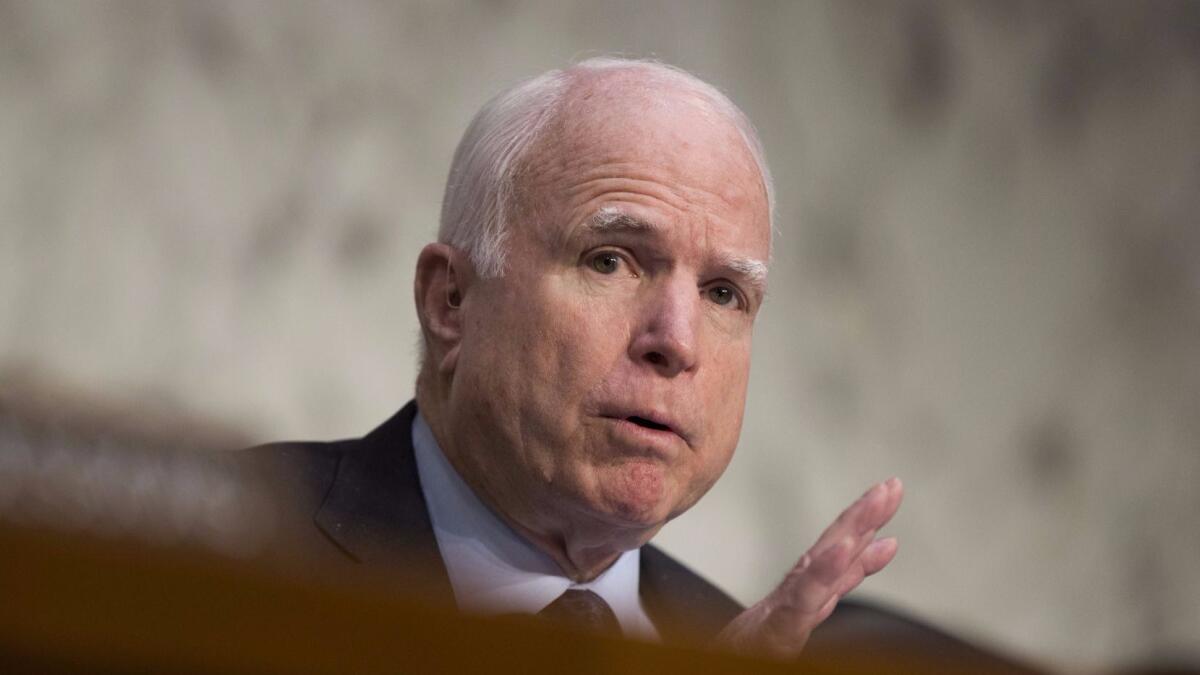Column: Will John McCain lead the loyal opposition?

Sen. John McCain (R-Ariz.) withdrew his endorsement of Trump in October of 2016, after a tape surfaced featuring the presidential candidate making lewd comments about women.
John McCain has long prided himself on his reputation as a maverick, a Republican willing to buck his party’s leaders. Now he faces what may be the biggest maverick moment of his career — and he sounds like a man who’s ready for a fight.
The conservative senator from Arizona has warned President Trump against cozying up to Russia’s Vladimir Putin (“a thug”). He’s criticized Trump’s order banning U.S. entry to people from seven mostly-Muslim countries (“harmful”). He’s denounced Trump’s decision to withdraw from a trade deal with Asia (“a serious mistake”) and his proposal to tax imports from Mexico (“insane”).
That’s not all. Asked about Trump’s suggestion that the U.S. resume using torture on suspected terrorists, he said: “I don’t give a damn what the president of the United States wants to do. We will not torture.… The law is the law.”
Other Republicans have objected to some of Trump’s actions. Lindsey Graham of South Carolina has echoed McCain on Russia. Bob Corker of Tennessee, chairman of the Senate Foreign Relations Committee, was one of half a dozen who criticized last week’s immigration order.
But ... will Republicans in Congress act as a serious check against Trump? Despite McCain’s outlier dissents, it still looks unlikely.
But none have taken on the White House on so many issues as the 80-year-old McCain. If there is to be any kind of loyal Republican opposition on Capitol Hill, he’s already its de facto leader.
“I feel, frankly, a greater burden of responsibility,” he told the Wall Street Journal recently. “The world’s on fire. We have more challenges than any time in the last 70 years…. Whatever influence I have, I need to exercise it.”
The differences between McCain and Trump are substantive. McCain is a Ronald Reagan conservative, a product of his party’s history. Trump ran against the GOP establishment and has abandoned large parts of the Reagan legacy.
The starkest contrasts are on foreign policy. McCain views Putin’s Russia as a major threat to the United States and its allies; Trump hopes to make Putin a strategic partner, and has dismissed criticism of Russia’s invasion of Ukraine.
But there’s personal history here too.
Early in his presidential campaign, Trump belittled McCain’s six years as a prisoner of war in North Vietnam. “He’s not a war hero,” candidate Trump said. “I like people that weren’t captured, OK?”
After Trump won the presidential nomination, McCain endorsed him — barely. (The senator said he supported “the nominee of my party,” without uttering his name.)
But after a tape surfaced of Trump bragging about sexually assaulting women, McCain withdrew his support — drawing an angry response. “The very foul-mouthed Sen. John McCain begged for my support during his primary (I gave, he won), then dropped me over locker room remarks!” Trump tweeted.
In November, McCain won Arizona by a bigger margin than Trump. Now, with a six-year term ahead, he is free to go his own way. After 34 years in Congress and two presidential campaigns of his own, he’s a hard man to intimidate.
But this is getting ahead of the larger story. Will Republicans in Congress act as a serious check against Trump?
Despite McCain’s outlier dissents, it still looks unlikely.
The normal impulse, especially for a party that has won control of every branch of government, is to rally around the president.
And Republicans in the Senate are fragmented. Some are unabashed Trump supporters. Others are quietly critical, but mostly on individual issues — Russia, immigration, trade.
Trump’s refugee ban drew more criticism than anything else he has done, but most of it was pragmatic, aimed at the chaotic rollout of the policy as much as any substantive demerits.
GOP senators, moreover, want to enact the big tax cuts the president has promised plus repeal and replace Obama’s healthcare law.
One more problem: Some Republican senators worry that if they appear disloyal, they’ll face a primary challenge from Trump supporters. So far, the president remains hugely popular among Republican voters.
If the Republican establishment decides to push back, it probably won’t take the form of open rebellion. It will look more like guerrilla warfare, with lawmakers doing tax reform and Obamacare their way, not Trump’s, and slow-walking proposals they dislike (a costly infrastructure plan, for example).
The battle for the soul of the Republican Party has long been underway. Trump’s arrival in the White House didn’t end it; it merely sent it spinning in new directions.
Twitter: @doylemcmanus
Follow the Opinion section on Twitter @latimesopinion and Facebook
More to Read
A cure for the common opinion
Get thought-provoking perspectives with our weekly newsletter.
You may occasionally receive promotional content from the Los Angeles Times.











